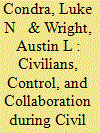| Srl | Item |
| 1 |
ID:
170012


|
|
|
|
|
| Summary/Abstract |
What affects civilian collaboration with armed actors during civil war? While theory and evidence confirm that harm by armed actors influences when and with whom civilians collaborate, we argue that collaboration is also a function of civilians’ perceptions of armed actors’ efforts to minimize collateral casualties. We test this argument using a series of nationwide surveys of Afghan civilians conducted quarterly between 2013 and 2015. Our data record civilian willingness to report roadside bombs to government authorities and perceptions of government and Taliban efforts to minimize civilian harm. Civilians are less (more) willing to collaborate with the government when they perceive the government (Taliban) carelessly using force, even after accounting for political sentiment, local security conditions, and a range of additional confounding factors. Moreover, our evidence suggests that perceived carelessness in the rival’s area of control influences collaboration. We discuss how these empirical results inform broader literatures on collaboration, conquest, occupation, and control.
|
|
|
|
|
|
|
|
|
|
|
|
|
|
|
|
| 2 |
ID:
185677


|
|
|
|
|
| Summary/Abstract |
Television is an overlooked tool of state building. We estimate the impact of televising criminal proceedings on public use of government courts to resolve disputes. We draw on survey data from Afghanistan, where the government used television as a mechanism for enhancing the legitimacy of formal legal institutions during an ongoing conflict. We find consistent evidence of enhanced support for government courts among survey respondents who trust television following the nation’s first televised criminal trial. We find no evidence that public confidence in other government functions (e.g. economy, development, corruption) improved during this period. Our findings suggest that television may provide a means of building state legitimacy during war and other contexts of competition between political authorities.
|
|
|
|
|
|
|
|
|
|
|
|
|
|
|
|